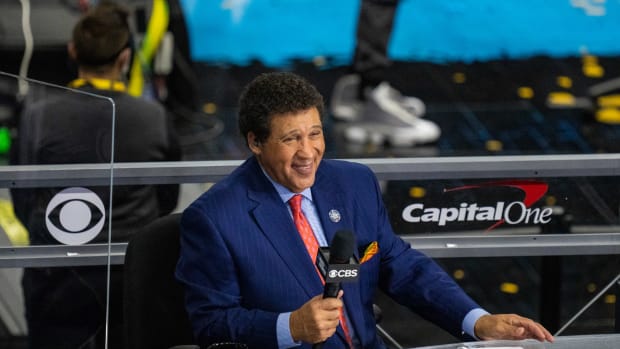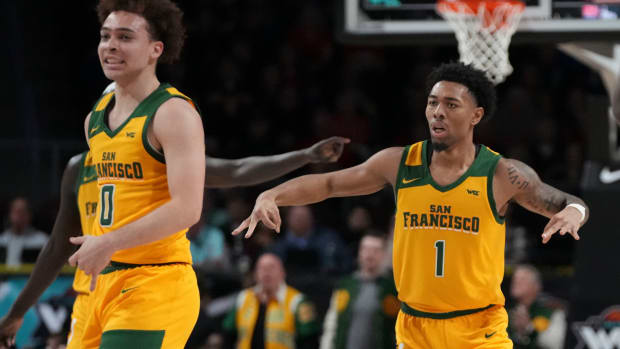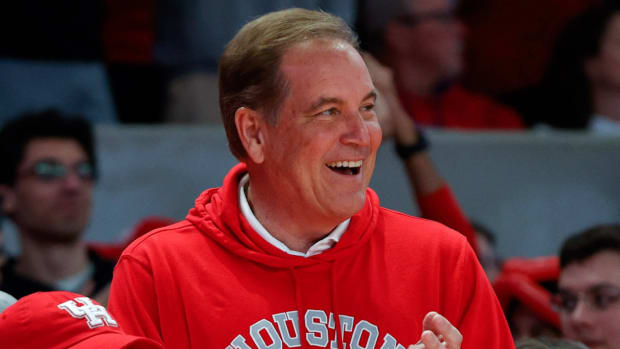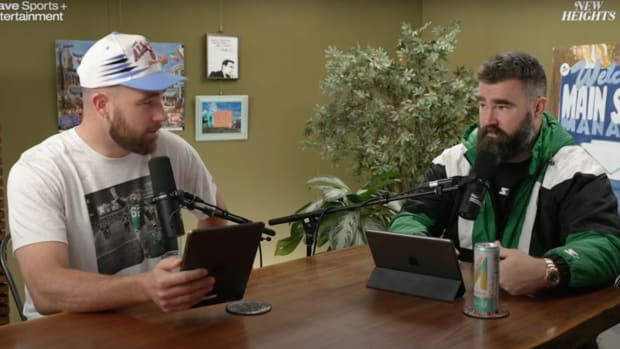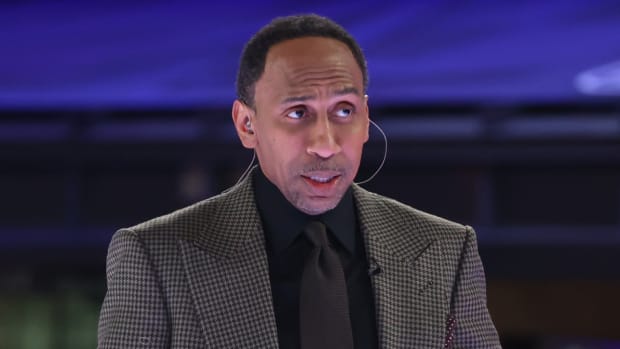Remembering Dick Enberg's One-In-A-Million Sports Broadcasting Career, Life
After calling NFL games for 42 years, as well as 26 Wimbledons (he would add two more), 23 French Opens, 14 NCAA men's basketball championships, 10 Super Bowls, nine Rose Bowls, four Olympic Games and plenty of other events for CBS, ESPN and NBC in a one-in-a-million sports broadcasting career, Dick Enberg jumped at the chance in late 2009 to take a job as the lead television voice of his hometown San Diego Padres. "To be the announcer where you live is a very special opportunity," Enberg told SI.com at the time.
Enberg passed away at age 82 on Thursday night at his home in his beloved La Jolla and the overwhelming number of tributes for him from the sports media world will be justified.
“With all due respect to other great announcers in the ‘70s and ‘80s if you were to have a decathlon of play-by-play, he would have won that decathlon of play-by-play because he did so many things exquisitely well,” said Bob Costas, on Friday morning. “He did seven or eight things really, really well, and was at or near the top of all those things. And he did with the combination of extraordinary craftsmanship, meticulous preparation, facility with words and a genuine—not a manufactured, but a genuine—boyish enthusiasm. He was a sentimental man but there was nothing inauthentic about that enthusiasm.”
Sportswriters, Broadcasters Honor Dick Enberg
It was a pleasure to marinate in his intellect as a viewer in multiple sports. Costas said one of the things likely overlooked regarding Enberg’s sports broadcasting genius will be how he seamlessly worked with an endless stream of analysts from multiple sports. A short sampling: Al McGuire and Billy Packer (college basketball); Bob Trumpy, Dan Dierdorf and Merlin Olsen (NFL); Bud Collins, Mary Carillo and Jon McEnroe (tennis); Don Drysdale (baseball), Johnny Miller (golf).
"CBS brought back Dick for the network's final U.S. Open, to honor his place at the network and in the tournament's history," said Carillo on Friday. "Dick and John McEnroe and I were to call a Roger Federer match, and about eleven minutes in, it began to rain and never stopped for the rest of the afternoon. Dick was genuinely crushed. I watched him pack his bag—he'd written out pages and pages of notes. He so wanted to tell the viewers what he felt about Roger, what he saw in him. I'm sorry he didn't get the chance. I also feel badly that his retirement happened the same year as Vin Scully's. It's like losing Mozart and Chopin at the same time."
“He sat between Billy Packer and Al McGuire—they could not have been more different, yet with Dick orchestrating it, they could not have complemented each other any better,” Costas said.
Last year Enberg told SI’s Jon Wertheim in a long podcast that he always enjoyed the challenge of the “raised hand,” a product of his love for higher education and working as an assistant professor and baseball coach at Cal State Northridge in the early 1960s.
Dick Enberg's Most Memorable Calls
“The preparation [for a broadcast] always was never work,” Enberg said. “I wanted to take the time to try to find some nugget or some piece of information or turn some phrase that might make the broadcast more interesting. The interest in a variety of sports comes back to when I was a kid. I memorized the sports page. The guys at the fraternity house would say if you want to read the sports page, you better get up earlier than Enberg.”
With a master’s and doctorate degree in health sciences from Indiana, Enberg was a scholarly man, which included a stint as a playwright. Enberg first got the idea for a one-man play about McGuire while composing a tribute for McGuire's funeral in 2001. "I started thinking about all the wonderful things I learned from him," said Enberg. "He was a street genius. The more I wrote, the more I realized there was so much material, it could be a play—Al McGuire sharing his wisdom with a college audience.” The play begins with McGuire leading Marquette to the 1977 NCAA title and ends with his battle with the blood disorder that took his life at age 72. "I put the words on the paper, but Al wrote every word of it. If it isn't good," Enberg said, "I'll just blame Al.”
(For a worth-reading-today profile of Enberg, click here.)
Costas and Enberg worked multiple Olympic opening ceremonies together and the two coined the phrase “tidbit ping pong” regarding items on each nation in the Parade of Nations. “He was always better than I was on the pageantry part because he had that genuine boyish enthusiasm for everything,” Costas said.
Enberg’s versatility was such that his career includes working both as an essayist on Olympic coverage and hosting a game show (Sports Challenge, from 1971 to 1979). But baseball was always his love above all.
“It was no slight toward any other sport but he always said baseball was his favorite sport,” Costas said. “He played baseball, he coached baseball. [Enberg’s signature call] ‘Touch em’ all’ is a pretty good call and he told me once that someone he either played with or coached with would say it on the bench. Lost in the shuffle, especially for younger people, was how good he was in the prime of his career doing [California] Angels games. He had a great phrase at the end of the game in which the Angels had won. He’d sign off and the last thing he would say if the a Angels had won was, ‘And the Halo Shines Tonight.’ Baseball was his favorite but he was just so good at so many things.”

